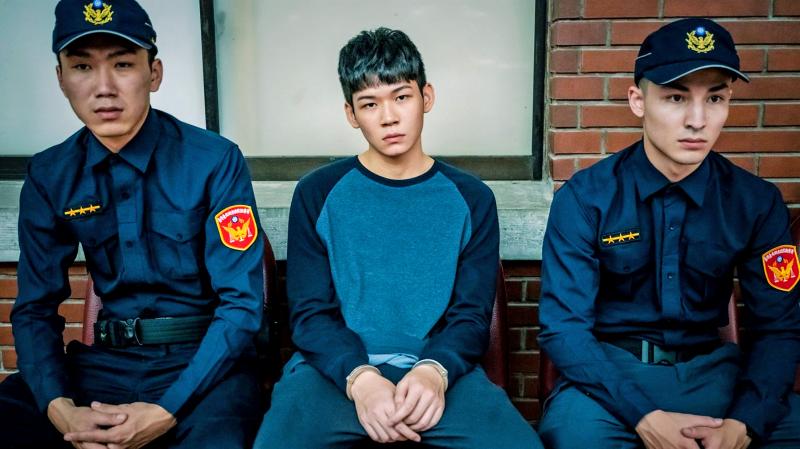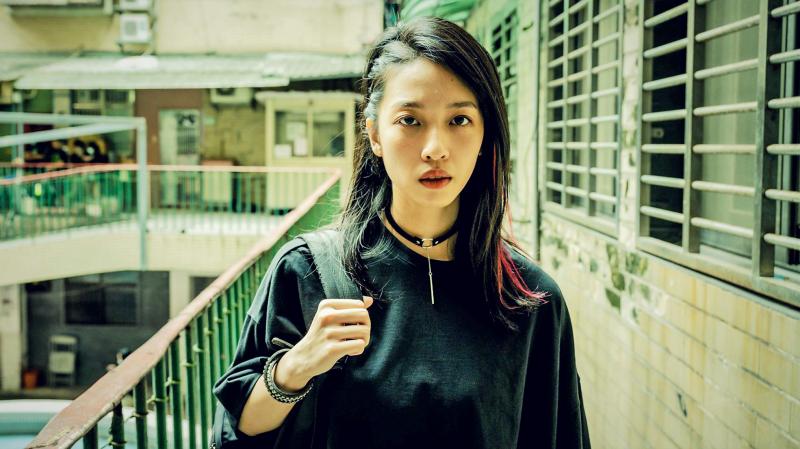Six people are set on a collision course when Jan Wen (Joseph Huang, 黃聖球) shoots a man in a night market on his 18th birthday. The teenager, who spends his time playing the online game King’s World (王者世界) and creating a popular Web comic with his pal Xing (Devin Pan, 潘綱大), is being forced by his strict father to study abroad after scoring poorly on his college exams. As he reaches a breaking point, he orders a gun online.
While society is often quick to condemn such perpetrators (and their parents), the social and psychological reasons leading up to the shooting remain a mystery, especially since this sort of violence rarely happens in Taiwan.
This is not the first production examining the topic after Cheng Chieh (鄭捷) in 2014 shocked the nation with his Taipei MRT knife rampage; notable productions include the 2019 drama series The World Between Us (我們與惡的距離) and last year’s Terrorizers (青春弒戀).

Photo courtesy of Hope Marketing Entertainment
Director Lou Yi-an (樓一安) gets quite ambitious with Goddamned Asura (該死的阿修羅), shifting from virtual gaming and reality, Jan Wen’s Web comic to an alternate “what if” timeline to weave a stylish, fast-paced, yet somewhat overloaded tale from the six seemingly random lives that are affected.
Of course, they’re all somewhat troubled and connected somehow, mostly through King’s World.
Mold (Mo Tzu-yi, 莫子儀) is an investigative reporter writing a story on urban renewal of a low-income housing complex (how many times has that Nanjichang Residences (南機場) courtyard appeared on the big screen?), juvenile delinquent Zero (Wang Yu-xuan, 王渝萱) is a gamer who lives in the complex with her alcoholic mother, Vita (Huang Pei-jia, 黃姵嘉) is a stressed out advertising executive trying to promote the game and her fiance Sheng (Lai Hao-che, 賴澔哲) is a popular King’s World livestreamer who works as an urban renewal officer for the city.

Photo courtesy of Hope Marketing Entertainment
The links between them definitely run deeper than that, but revealing more would spoil the plot. In response to society judging people and their transgressions in too simplistic a manner, this film goes all out to show that nothing is that straightforward.
The theme of being trapped is often seen in the imagery; Jan Wen and Xing repeatedly try to free a dog locked in a small cage, and the Roomba vacuum cleaner in Xing’s apartment is stuck in a small area, going round and round in circles. The acting is solid across the board, and production value high except for the soundtrack, which is rather generic and monotonous.
The viewer needs to focus on each character and their actions to completely follow the events and make sense of the different aspects of reality presented, and it’s definitely an entertaining watch that also works the brain.
Although some have bigger roles than others, the six characters are complex and multi-dimensional, each showing their positive and negative sides. Lou has obviously given them much thought and there are surprisingly no glaring plot holes in such a tangled web. There’s still a lot to keep track of, however, and the dizzying narrative makes the film less impactful and memorable by the end.
Things get a bit preachy in the last part as Lou searches for a resolution; the message is clear enough that a tiny shift of events could result in completely different decisions and outcomes, and that people shouldn’t be so quick to pass judgment on those who commit horrific acts. Anyone could possibly become a killer depending on what goes wrong that day — Mold, for example, almost beats Jan Wen to death in anger after witnessing the shooting.
However, how much does this idea abscond the responsibilities of the perpetrators? Life is not a video game that can just be reset, just like how Jan Wen’s father couldn’t, in his words, “reset” his son’s life by sending him out of the country.
Fortunately, the film doesn’t take the idealistic, sentimental route; tragedy is not prevented this easily even if you have a reset button. It’s easy to condemn murderers and harass their families, but how do we change society into a less repressed place where these highly stressed-out characters can have some support and respite?

Jacques Poissant’s suffering stopped the day he asked his daughter if it would be “cowardly to ask to be helped to die.” The retired Canadian insurance adviser was 93, and “was wasting away” after a long battle with prostate cancer. “He no longer had any zest for life,” Josee Poissant said. Last year her mother made the same choice at 96 when she realized she would not be getting out of hospital. She died surrounded by her children and their partners listening to the music she loved. “She was at peace. She sang until she went to sleep.” Josee Poissant remembers it as a beautiful

March 2 to March 8 Gunfire rang out along the shore of the frontline island of Lieyu (烈嶼) on a foggy afternoon on March 7, 1987. By the time it was over, about 20 unarmed Vietnamese refugees — men, women, elderly and children — were dead. They were hastily buried, followed by decades of silence. Months later, opposition politicians and journalists tried to uncover what had happened, but conflicting accounts only deepened the confusion. One version suggested that government troops had mistakenly killed their own operatives attempting to return home from Vietnam. The military maintained that the

Before the last section of the round-the-island railway was electrified, one old blue train still chugged back and forth between Pingtung County’s Fangliao (枋寮) and Taitung (台東) stations once a day. It was so slow, was so hot (it had no air conditioning) and covered such a short distance, that the low fare still failed to attract many riders. This relic of the past was finally retired when the South Link Line was fully electrified on Dec. 23, 2020. A wave of nostalgia surrounded the termination of the Ordinary Train service, as these train carriages had been in use for decades

Lori Sepich smoked for years and sometimes skipped taking her blood pressure medicine. But she never thought she’d have a heart attack. The possibility “just wasn’t registering with me,” said the 64-year-old from Memphis, Tennessee, who suffered two of them 13 years apart. She’s far from alone. More than 60 million women in the US live with cardiovascular disease, which includes heart disease as well as stroke, heart failure and atrial fibrillation. And despite the myth that heart attacks mostly strike men, women are vulnerable too. Overall in the US, 1 in 5 women dies of cardiovascular disease each year, 37,000 of them